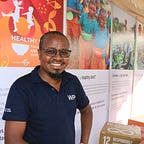‘We will not quit until every last family in Ethiopia can afford a decent meal every day’
Ahmed helps oil the cogs of Sub-Saharan Africa’s largest safety net
Ahmed Nur Abdi Daud is a man on a mission to end hunger.
He is a key ally of WFP’s in his role as one of the eight regional coordinators for the Government’s Productive Safety Net Programme (PSNP), arguably the biggest safety net in Sub-Saharan Africa reaching about 8 million people who would otherwise face severe food scarcity.
For Ahmed, this is not just a job. It is a calling.
“I grew up in Dagahabour woreda, about 170 km from Jigjiga in this [Somali] region,” says Ahmed, who is now the Somali Region PSNP coordinator. “We did not have much — ours was an average family but my parents afforded me an education.”
Ahmed’s home district is one of those receiving assistance through PSNP. The programme provides conditional cash transfers to 1.7 million people in return for their work on community assets including water and soil conservation and road building. In support of the Government’s scaling up of PSNP to respond to shocks, WFP is also providing over 600,000 people with cash transfers.
“After my university studies, I got the opportunity to come back and work with the food security bureau,” says Ahmed. “Every day, I’m pre-occupied with thoughts of solving the chronic food insecurity for my people — it is challenging, but also rewarding especially when you see a family that was previously borrowing to buy food making progress towards being able to feed themselves.”
The success of PSNP in Ethiopia can be attributed to many factors. One of them is the investment in human resources — the continuous and rigorous training of Government officials responsible for the day-to-day running of the programme.
WFP and partners have developed public works guidelines to steer the implementation of appropriate and high quality projects based on the specific needs of the different parts of the country. This has allowed Government workers like Ahmed to learn specialized skills relevant to the type of communal projects that best suit the needs of families living in the Somali Region.
At the national level, in 2019 alone, about US$10 million has been allocated for human development, mainly to address capacity development needs of the front-line government staff.
“I have acquired skills in managing physical resources, human resources, programme targeting, resource transfers, public works planning, implementation, monitoring and working with different stakeholders as a result of training delivered through PSNP,” says Ahmed.
“These skills have helped me navigate the complexities of PSNP,” he says. “Without the training, it would have been very difficult — even impossible — to do my job.”
Ahmed has advanced his studies earning a MSc in Disaster Risk Management and Sustainable Development.
“I have to stay abreast in this field for me to better serve the community,” says Ahmed. “It gives me great joy and motivation to see some of the very poor families that we serve educating their children up to the university level — as the [PSNP] coordinator, I have to be better.”
Ahmed vows to stay the course.
“We will not quit until every last family in Ethiopia can afford a decent meal every day.”
Established in 2005 to address the impact of climate risks on food security, PSNP runs with support from a host of donors and UN agencies, under the leadership of the Government.
Since 2016, WFP’s PSNP portfolio has received US$97 million in contributions and has assisted approximately 2 million people in Afar and Somali regions.
Click here to learn more about WFP’s work in Ethiopia.
